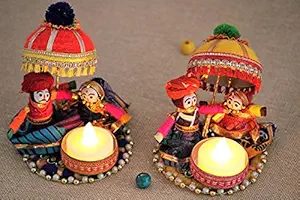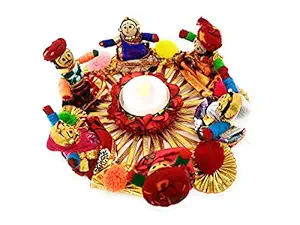परिचय
महाभारत विश्व का सबसे महान महाकाव्य है, जो अच्छाई और बुराई, धर्म और अधर्म के बीच संघर्ष की कथा कहता है। इसे महर्षि वेदव्यास ने रचा था और इसमें 100,000 से अधिक श्लोक हैं। यह सिर्फ युद्ध की कथा नहीं है, बल्कि एक दार्शनिक और आध्यात्मिक मार्गदर्शक भी है, जो आज भी मानवता को प्रेरित करता है।
मुख्य विषय: धर्म और नियति
महाभारत की कथा कुरु वंश के दो पक्षों—पांडव और कौरव—के बीच संघर्ष पर आधारित है। इसका मूल संदेश है: धर्म का पालन और भाग्य का निर्माण कर्मों से होता है। श्रीकृष्ण ने अर्जुन को भगवद गीता के माध्यम से कर्म और धर्म का पाठ पढ़ाया।
प्रमुख पात्र और उनकी भूमिकाएँ
-
भगवान श्रीकृष्ण – अर्जुन के मार्गदर्शक और दिव्य उपदेशक।
-
अर्जुन – महायोद्धा जो धर्म संकट में फँसा था।
-
कर्ण – एक महान योद्धा, जिसका जीवन दुखों से भरा था।
-
द्रौपदी – साहसी रानी, जिसने अपमान का प्रतिशोध लिया।
-
युधिष्ठिर – सत्य और धर्म का प्रतीक।
-
भीष्म पितामह – प्रतिज्ञा से बंधे महायोद्धा।
-
दुर्योधन – अहंकारी राजकुमार, जिसकी हठधर्मिता ने उसे विनाश की ओर ले गया।
आज के युग में महाभारत का महत्व
महाभारत केवल एक कथा नहीं, बल्कि जीवन प्रबंधन, नेतृत्व, नीति और कर्म के सिद्धांतों का ग्रंथ है। यह हमें सिखाता है कि हमें अपने कर्तव्यों का पालन करना चाहिए और कर्म के परिणामों को स्वीकार करना चाहिए।
निष्कर्ष
महाभारत एक अनन्त प्रेरणास्रोत है, जो सत्य, धर्म और मानवता के लिए एक मार्गदर्शक बना रहेगा। इसकी शिक्षाएँ न केवल अतीत में बल्कि आज के जीवन में भी उतनी ही प्रासंगिक हैं।
Introduction to the Mahabharata
Overview of the Epic
The Mahabharata is a timeless Indian epic that narrates the story of the Pandavas and Kauravas, exploring dharma, destiny, and moral dilemmas.
Historical Significance
The epic reflects the history, culture, and society of ancient India, providing insight into political, social, and spiritual life.
Mythological Importance
It blends mythology and philosophy, showing divine interventions, cosmic principles, and the struggle between good and evil.
Structure of the Epic
The Mahabharata contains 18 books, over 100,000 verses, and numerous sub-stories, making it the longest epic in the world.
Cultural Relevance
The epic has influenced Indian literature, theatre, art, and religious practices for centuries, continuing to inspire people worldwide.
Key Characters
The Pandavas
The five Pandavas exemplify righteousness, bravery, and moral integrity, each representing unique virtues and life lessons.
The Kauravas
The Kauravas, led by Duryodhana, symbolize ego, ambition, and moral challenges, highlighting the consequences of unethical behavior.
Krishna – The Divine Guide
Krishna guides Arjuna with wisdom, strategy, and spiritual teachings, emphasizing dharma, duty, and devotion.
Draupadi – The Queen
Draupadi demonstrates courage, intelligence, and resilience, influencing major events and moral choices within the epic.
Supporting Characters
Figures like Bhishma, Karna, Drona, and Kunti provide examples of loyalty, ethics, and the complexities of human decisions.
Major Themes
Dharma and Ethics
The Mahabharata emphasizes the importance of dharma, moral duty, and ethical conduct in personal and societal life.
Good vs Evil
The epic portrays the eternal struggle between good and evil, teaching lessons about justice, morality, and righteousness.
Family and Loyalty
It explores family bonds, loyalty, and interpersonal responsibilities, showing how moral choices affect relationships and society.
Courage and Bravery
The characters’ actions demonstrate courage, resilience, and moral strength, inspiring readers to uphold values in challenging situations.
Spiritual Wisdom
The Mahabharata imparts knowledge on self-realization, devotion, meditation, and the pursuit of a righteous and meaningful life.
Lessons from the Epic
Moral Lessons
The epic teaches integrity, honesty, responsibility, and making ethical decisions even under pressure.
Life Lessons
Through the Pandavas and Kauravas, readers learn about perseverance, humility, courage, and the consequences of choices.
Leadership Lessons
Yudhishthira, Krishna, and Bhishma provide guidance on leadership, strategic thinking, and maintaining ethics while leading others.
Relationships and Trust
It emphasizes trust, loyalty, and respect in personal and social relationships, showing the value of ethical bonds.
Consequences of Actions
The epic illustrates that every action has consequences, reinforcing responsibility, accountability, and moral awareness.
Cultural Impact
Influence on Art and Literature
The Mahabharata has inspired literature, theatre, music, paintings, and storytelling traditions across India and beyond.
Influence on Popular Media
It has been adapted into films, TV series, comics, and digital platforms, bringing its teachings to modern audiences.
Religious Significance
The epic influences rituals, festivals, spiritual practices, and moral values, playing a key role in Hindu tradition.
Global Recognition
Its universal themes of morality, duty, heroism, and dharma have gained recognition and study worldwide.
Enduring Legacy
The Mahabharata continues to inspire art, philosophy, literature, and spiritual guidance, remaining relevant across generations.
The Mahabharata is a timeless Indian epic that narrates the story of the Pandavas and Kauravas, exploring dharma, destiny, and moral dilemmas.
The epic reflects the history, culture, and society of ancient India, providing insight into political, social, and spiritual life.
It blends mythology and philosophy, showing divine interventions, cosmic principles, and the struggle between good and evil.
The Mahabharata contains 18 books, over 100,000 verses, and numerous sub-stories, making it the longest epic in the world.
The epic has influenced Indian literature, theatre, art, and religious practices for centuries, continuing to inspire people worldwide.
The five Pandavas exemplify righteousness, bravery, and moral integrity, each representing unique virtues and life lessons.
The Kauravas, led by Duryodhana, symbolize ego, ambition, and moral challenges, highlighting the consequences of unethical behavior.
Krishna guides Arjuna with wisdom, strategy, and spiritual teachings, emphasizing dharma, duty, and devotion.
Draupadi demonstrates courage, intelligence, and resilience, influencing major events and moral choices within the epic.
Figures like Bhishma, Karna, Drona, and Kunti provide examples of loyalty, ethics, and the complexities of human decisions.
The Mahabharata emphasizes the importance of dharma, moral duty, and ethical conduct in personal and societal life.
The epic portrays the eternal struggle between good and evil, teaching lessons about justice, morality, and righteousness.
It explores family bonds, loyalty, and interpersonal responsibilities, showing how moral choices affect relationships and society.
The characters’ actions demonstrate courage, resilience, and moral strength, inspiring readers to uphold values in challenging situations.
The Mahabharata imparts knowledge on self-realization, devotion, meditation, and the pursuit of a righteous and meaningful life.
The epic teaches integrity, honesty, responsibility, and making ethical decisions even under pressure.
Through the Pandavas and Kauravas, readers learn about perseverance, humility, courage, and the consequences of choices.
Yudhishthira, Krishna, and Bhishma provide guidance on leadership, strategic thinking, and maintaining ethics while leading others.
It emphasizes trust, loyalty, and respect in personal and social relationships, showing the value of ethical bonds.
The epic illustrates that every action has consequences, reinforcing responsibility, accountability, and moral awareness.
The Mahabharata has inspired literature, theatre, music, paintings, and storytelling traditions across India and beyond.
It has been adapted into films, TV series, comics, and digital platforms, bringing its teachings to modern audiences.
The epic influences rituals, festivals, spiritual practices, and moral values, playing a key role in Hindu tradition.
Its universal themes of morality, duty, heroism, and dharma have gained recognition and study worldwide.
The Mahabharata continues to inspire art, philosophy, literature, and spiritual guidance, remaining relevant across generations.


